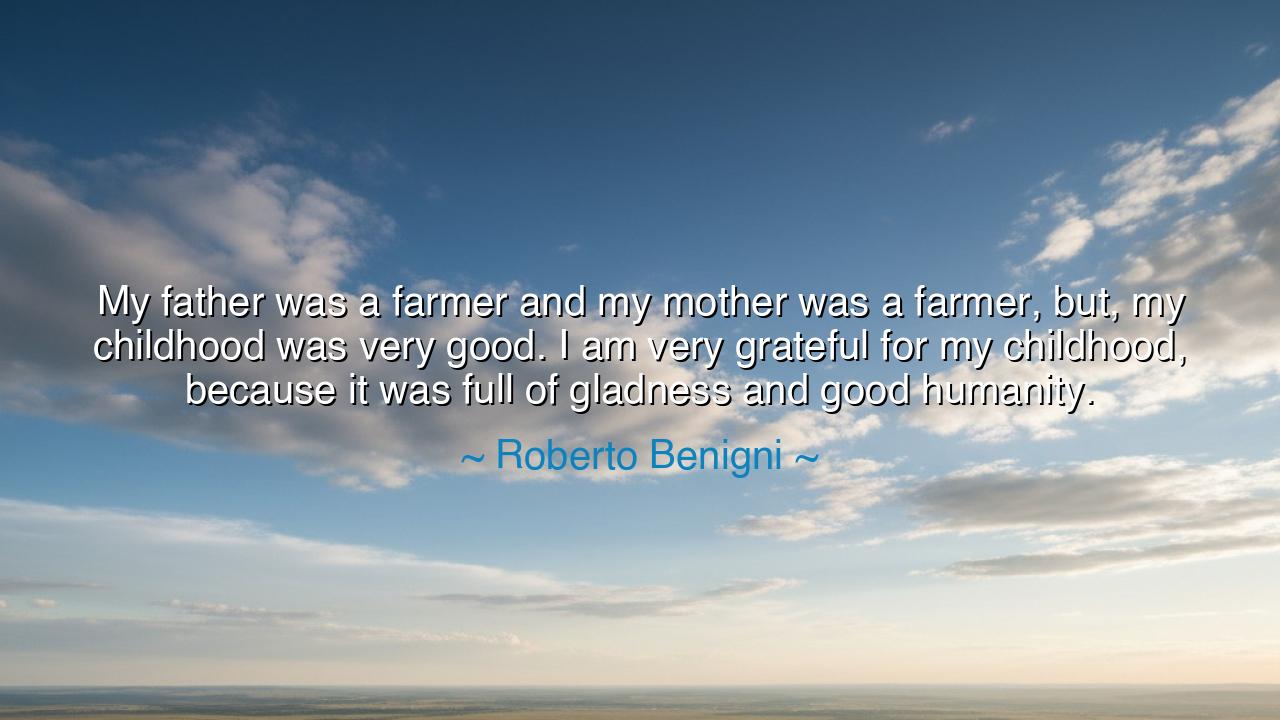
My father was a farmer and my mother was a farmer, but, my
My father was a farmer and my mother was a farmer, but, my childhood was very good. I am very grateful for my childhood, because it was full of gladness and good humanity.






Roberto Benigni, with the heart of a poet and the laughter of a child, once spoke: “My father was a farmer and my mother was a farmer, but my childhood was very good. I am very grateful for my childhood, because it was full of gladness and good humanity.” In these words shines the ancient truth that joy does not spring from wealth or grandeur, but from simplicity, labor, and love. For a field may yield crops, but more importantly, it may cultivate character; a humble home may lack riches, but it can overflow with humanity.
The meaning of this saying is deeply rooted in the soil of gratitude. Benigni acknowledges that though his parents were farmers, working the land with sweat and toil, his childhood was not marked by poverty of spirit but by abundance of gladness. This reveals the paradox of life: that the richest treasures are often found in the simplest lives. His joy was not born of excess but of community, of warmth, and of a household where kindness and laughter were the true inheritance.
History mirrors this lesson. Consider the young Abraham Lincoln, who was born in a log cabin and raised on the frontier by parents who tilled the earth. His family had little, yet the values of hard work, honesty, and resilience became the foundation of his greatness. Lincoln himself would later say that all he was, or ever hoped to be, he owed to his mother. In the same way, Benigni testifies that the greatness of his life and art was not hindered by his parents’ simplicity, but nourished by it.
The mention of farmers carries symbolic power. For farmers embody patience, humility, and faith. They plant seeds without certainty, trusting in rain and sun to bring forth harvest. So too, parents who raise children in simplicity plant seeds of humanity that bear fruit in later generations. Benigni’s parents may not have given him riches, but they gave him a world alive with soil, with laughter, and with a sense of connection to the rhythms of life. From this ground grew his enduring spirit.
There is also an echo here of the eternal contrast between material wealth and humanity. In a world that often equates success with possessions, Benigni reminds us that the measure of a childhood is not what was owned, but what was learned. The gladness of his home came not from objects, but from relationships, from stories, from the dignity of honest labor. His gratitude reflects the wisdom of the ancients, who taught that happiness is found not in abundance of things, but in the abundance of virtue.
The lesson is clear: do not despise humble beginnings, nor long for what you lack while ignoring what you have. If your childhood was shaped by love, by laughter, by the goodness of humanity, then you have been given treasures greater than gold. Parents and children alike should remember that it is not wealth that nourishes the soul, but kindness, simplicity, and joy. These are the gifts that endure, that empower the spirit to rise even in times of hardship.
Therefore, let Roberto Benigni’s words be passed down as wisdom: that a childhood among farmers, a life rooted in soil and humanity, can produce a heart full of gladness. Let all who hear remember to give thanks not for what is large or impressive, but for what is true, human, and good. For in these things lies the foundation of greatness, the seed of joy, and the heritage that no wealth can buy.






AAdministratorAdministrator
Welcome, honored guests. Please leave a comment, we will respond soon